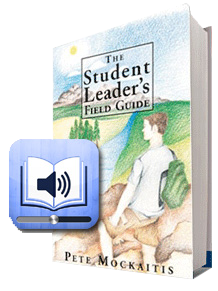Why Direct Communication Matters
One of the first challenges you’ll face as a college student is learning how to be effective in communicating with others. Early on, this means asking awkward questions.
Whether you want to ask something from a friend or family, to establish ground rules with a new roommate, or resolve a conflict in a student organization, there will always be awkward questions we don’t want to ask, even though we should. We don’t like asking awkward questions because we don’t like making others—neither strangers nor close friends—feel uncomfortable. Sometimes it seems easier to avoid tough conversations and forget about awkward questions altogether. Instead, we might be tempted to believe that a problem will work itself out over time. Yet the truth is that no matter how awkward, it is almost always best to tackle such problems head-on. This means having the courage to ask awkward questions when they arise, but being direct and respectful, too.
With new technologies like social media and text messaging, it has never been easier to reach out and connect with others. However, new research has shown how they can complicate strained relationships, and in many cases people have used these tools to keep others in their life at an arm’s length. Nowadays, when it’s so easy, who can blame them? Everyone has been guilty of being passive aggressive at one point or another–avoiding confrontation over something even if it upsets us–but we must understand that even if we believe we’re the wiser for avoiding conflict, being passive aggressive only sets the stage for bigger, more complicated problems down the line.
Dispelling some of the myths
For one thing, we make a mistake when we assume others will recognize when we are upset by something they do. Nobody is a mind-reader. Even spouses and lifelong friends must have open conversations to keep their relationships strong. In addition, we can’t assume others will immediately understand why we have a problem.
We’ll tend to believe that by avoiding talking about a problem we have with another person, we’re being respectful. But this is wrong. When we stifle ourselves, we are likely to resent the other person. This kind of pent-up anger can contribute to stress, anxiety, and even depression. We have to wonder: is avoiding awkward questions worth all the trouble?
Awkward questions, or respectful relationships?
Having a respectful relationship includes being honest, even when it’s about something that bothers us. This represents the “first level” of awkward questions: “Can I be straightforward about something?” “What if I told you this bothered me?”
A respectful relationship also involves accommodating the other person’s needs. This represents the “second level” of awkward questions: “Is there a particular reason you do this?” “How can we work together on this?”
Breaking it down like this and stripping away the context, the questions don’t seem so difficult after all. The most difficult parts about asking awkward questions is getting started. However, you can feel less overwhelmed if you have a plan in mind for how the conversation will go:
- Stand your ground: Once you start the conversation, don’t shy away from it.
- Take turns speaking: Structure the conversation in an organized way; don’t let it boil over into a conflict.
- Listen: This is crucial. Just as you’re dealing with your feelings about the other’s behavior, it’s very possible that you haven’t entirely picked up on the other person’s feelings either. Repeat back to the other person how you understand their position.
- Set goals: End the conversation with goals, including an agreement to check in with one another.
The benefits of being direct are immense. Here are just four of them.
- If you take the initiative, the other person will respect you for being forthcoming.
- It prevents the current problem from snowballing into something worse.
- Moreover, it sets a simple precedent for resolving future conflicts, and you and the other person will feel more at ease in discussing other issues as they arise.
- Finally, by being honest, open, and attentive, you will strengthen your relationship with the other person, strengthening your friendship, family, or organization exponentially.

 Email updates to sharpen your skills
Email updates to sharpen your skills
 Full-text PDF of my book
Full-text PDF of my book
 Full-audio MP3 of my book
Full-audio MP3 of my book
Leave a Reply